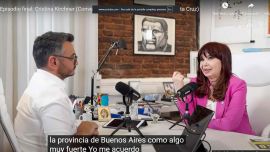The death of former US secretary of state Henry Kissinger on Wednesday at the age of 100 has put his policy towards Argentina in the spotlight once again.
Kissinger’s relationship with the brutal 1976-1983 military dictatorship that ruled Argentina was in some ways a ‘known-unknown’ – his endorsement of the state terror enforced by the junta’s leaders was widely known in diplomatic circles but it was not confirmed until the United States government declassified dictatorship-era US military and intelligence files under the Barack Obama administration in 2016.
Among the treasure trove of documents were a number of diplomatic cables highlighting how relations between Washington and Buenos Aires during the junta’s seven-year reign of terror. They reveal that Kissinger all but gave the green light to the military leaders to continue crimes against humanity, and that the Democratic administration of Jimmy Carter put pressure on the Casa Rosada in an attempt to prevent more enforced disappearances from taking place.
The cables revealed that in June 1976, just three months after Argentina’s military coup, Kissinger visited Santiago, where he met with Chilean dictator Augusto Pinochet, then an ally of the White House and the promoter of Operation Condor (or Plan Cóndor), a coordinated campaign of state terror and political repression carried out by ruling dictatorships in the Southern Cone with the support of the US government.
Two days later, on June 10, 1976, Kissinger met with Argentina’s then-foreign minister, Navy vice-admiral César Augusto Guzzetti, in Santiago.
"If there are things that have to be done, you should do them quickly,” Kissinger, who was already aware of the massive human rights abuses taking place, told the official. “But you should get back quickly to normal procedures."
Those words were taken as a green light for the ongoing abductions and enforced disappearances. The comment forms part of a 13-page memorandum detailing the meeting.
According to the report, Guzzetti said Argentina's main problem is "terrorism," to which Kissinger responded: "We have followed events in Argentina closely. We wish the new government well. We are aware you are in a difficult period. It is a curious time, when political, criminal, and terrorist activities tend to merge without any clear separation. We understand you must establish authority.”
Kissinger also controversially visited Argentina during the 1978 World Cup as a special guest of then-dictator Jorge Videla, against the advice of the US envoy in Buenos Aires at the time. The US government was at that time attempting to pressure the junta over the ongoing repression and was angered by his decision to attend.
One of the declassified US documents states "his praise for the Argentine government in its campaign against terrorism was the music the regime longed to hear."
– TIMES





















Comments